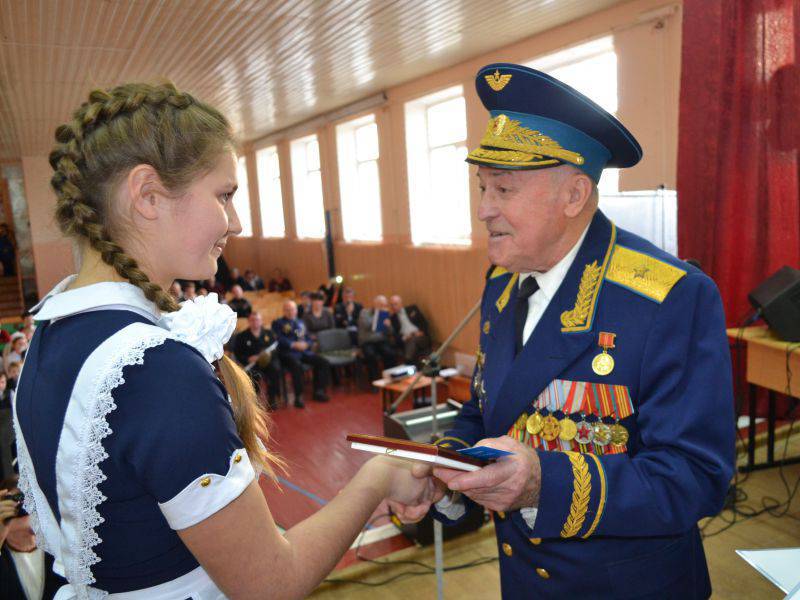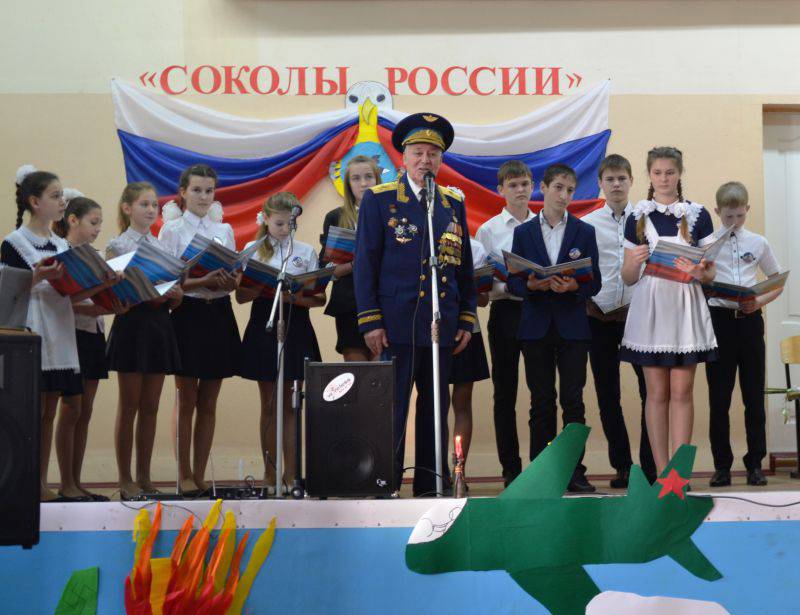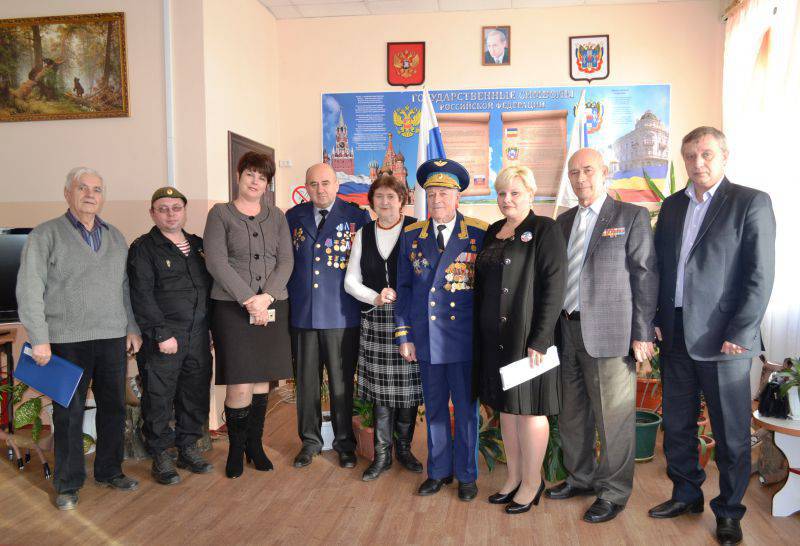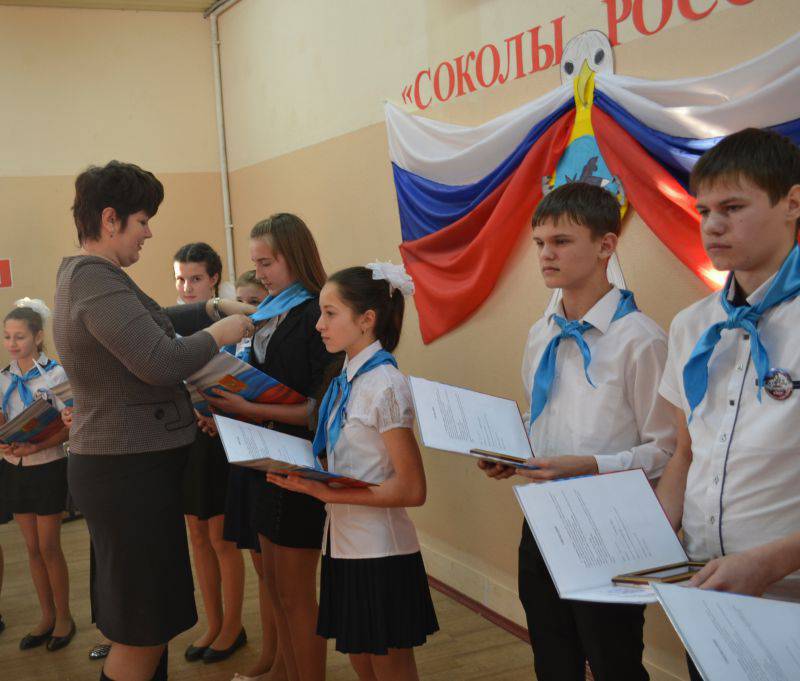Twelve Apostles with Blue Ties
History This one started with white cranes. These holy lines, learned back in school, are still kept in memory:
"It seems to me sometimes
what are the soldiers
From the bloody not come
fields,
Not in our land fallen
sometime
And turned
in white cranes.
White Crane Day was established by the writer and publicist, winner of the award "The Best Poet of the 20 Century" Rasul Gamzatov. His song "Cranes" has become a hymn to Memorial Day. This is a day of poetry and memory for all those who died on the fronts of various wars. More than two decades in many cities of Russia and the former Soviet republics is celebrated the Day of white cranes - an international holiday, outside of time and space.
It is a wonderful day, and I remembered him when these beautiful words of the song were sung by Tatyana Ischenko, a teacher at the secondary school in the village of Generalsky (Rostov Region). And Tatyana sang on this day for the children and war veterans who were gathered in the most different corners of the world in a spacious hall. It was an unusual collection. There was no such event in this small rural school, it was only due to the very spiritual devotees, thanks to whom the memory of the glorious past comes alive in the heart of people. I have already written about the movement “Falcons of Russia”, but when they “rise” again and take their new comrades into the ranks, I “fly” with them. Although it is very difficult for several reasons.
It turned out that in some urban schools in Rostov, the idea to support this undertaking of the veteran organization of the Fourth Red Banner Air Army was practically abandoned. The city became lazy and unaffordable, if only there were no unnecessary problems and unnecessary fuss. In this way, one can characterize the position of the heads of some schools, who consider general educational institutions to be their own patrimony, their “pride”, where entry to strangers with ideas is simply forbidden.
It is a different matter in rural schools. Here, people are responsive and gladly respond to many initiatives of veterans, and willingly help them with this. The Kalinin farm in the Rostov region already has a museum of the pilot of Hero of the Soviet Union, lieutenant colonel Alexei Leontyevich Krivonos. At first, the school had a museum corner, and then the area was significantly expanded.
In the village of Kirov a museum room was opened named after the Hero of the Soviet Union Vasily Mikhailovich Drygin, a 229th fighter pilot aviation divisions of the 4th Air Army of the North Caucasus Front.
And now, finally, the third swallow: in the village of Generalsky, where the fiercest battles took place during the Great Patriotic War, a museum named after Alexander Ivanovich Pokryshkin was opened. And besides this, a bust of this famous pilot was set up in the school lobby. And every day, when they come to school, they will look at him, so distant at first glance, but becoming native for twelve students of this school, who were given the breastplates “Falcon of Russia”, and shrillly sky-blue ties were tied around his neck , personifying their connection with the sky, where the hardest battles took place in the distant past, blood was shed. But the younger generation has an insufficient idea about it, they really cannot imagine the burden of the war, and many of us also cannot fully understand and accept that past war. But the main thing that their forming young souls take is holiness and participation in those far-reaching feats. You should have seen with what tenderness the fragile, thin hands of the girl held the “Falcon of Russia” sign. And there was still growing pride in the girl's eyes. This pride was read on other faces.
The youngest of the 10-year-old Valeria Lyasheva (she does well at school, attends vocal, literary, drama and other circles), and Viktor Vladimirovich Grishin together open the bust of Pokryshkin. And all the comrades Valerie gathered here.
Like the twelve apostles, they stood near the bust of Pokryshkin and listened to the retired Major General Aviation, Chairman of the Union of War Veterans and Military Service 4 of the Red Banner Air Army, Viktor Vladimirovich Grishin. He told them about Pokryshkin and how during the war years, eighteen-year-old girls took to the sky on fragile Po-2 airplanes. They did not take parachutes with them - because it was necessary to take more bombs and drop them on the luminous enemy fires, which were extinguished from the hands of brave pilots.
By the way, most of the students who received the “Falcons of Russia” medal from the hands of Major General Viktor Grishin in the general school of general education were girls. Here is the entire list: Anastasia Kolodko, Anna Kryshtal, Anna Rogalskaya, Valeriya Rubtsova, Anastasia Ostapenko, Maria Koval, Kirill Brazhnikov, Ivan Glushchenko, Alexander Ischenko, Tatyana Lustrous, Taslakyan Oganes.
I list them by name because they will read this article in the Military Review, and this will also be a memory and pride for them. That particular pride that will cut into their souls and hearts forever. And, no matter how later their fate may be, they will remember this and be proud of it.
And I would also like this article to be read by those boys that were spinning and talking in the back row, while teachers tried to rein in them all the time. But it was clear to me that they, too, terribly wanted to be there, in the row of those who were awarded, and to receive this cherished badge. And these boys' faces were so bright, despite their leprosy, and they encouraged themselves not just like that, but to hide their embarrassment and their desire to be among the first. And it seems to me that they will be the first.
After all, Pokryshkin also violated outdated military instructions, which many forbade using in battle, and even Pokryshkin sat in the guardhouse, but even there he was - what a character! - developed and analyzed the schemes of his future battles. He had no doubt that he would again be in the sky, he would be the first in battle again.
So, boys, I don’t know, unfortunately, your names, but I think they will know and write about you in the future. I remember you boys and believe in you. By the way, when we were returning from your village, the veterans, after listening to my defensive speech in your address, said that of these guys, too, there is a sense. This is evidenced by the pilot, retired colonel Pavel Kirillov, who is a member of the presidium of the veteran organization 4 of the Red Banner Air Force and Air Defense Army.
It is noteworthy that the diary of the Pokryshkin squad for the 1966-1967 school year, which contained a list of the pioneers of the squad, was preserved in the local history museum of the school. For example, detachment number XXUMX class bore the name of Pavlik Morozov. The chairman of the board of the detachment was Olya Syrovezhko. The second squad of the 14 “a” class bore the name of Larisa Mikheeva, the third squad of the 5 “b” class was named in honor of F.E. Dzerzhinsky.
When you leaf through this handwritten document, there is a feeling of something alive, real. After all, they made out such albums by hand, carefully writing out letters with blue ink: “Detachment No. XXUMX of 1 class students visited the village of Petrovka. They were looking for the parents of Sasha Korshun, the hero tanker who died during the liberation of the village of Generalskoye. Pioneers have established that, perhaps, his relatives live in the Bolshaya-Krepkaya settlement ”.
Luda Shalatonova also designed the same albums. She headed the pioneer organization of the Pokryshkin school in Soviet times and studied well, graduated from the institute and returned to her native village, became the principal of that school. Therefore, this is largely due to the fact that she supported the initiative of the veterans of the fourth air army and continued the transfer of this spiritual relay to the next generation.
Lyudmila Viktorovna Shalatonova says that the battles here during the Great Patriotic War were terrible because at first one of the main lines of defense of the Soviet troops was here, and then the Germans began to plow the long-suffering Russian land. Those trenches are still preserved: they are zigzagging along the slopes, encircling the village with a dashed trait reminiscent of war.
Search engines here conduct permanent excavations. Something donated to the school museum.
The remains of past battles, distorted by explosions, are neatly laid out on shelves: a fragment of a wrecked German staff car, a cover from a German MG-42 machine gun, a Makarov pistol, bayonets from a three-line rifle, a sight with a Russian optical rifle, tank headlight. During the spring flood, they pulled a wheel from the heavy Soviet tank KV-2, supporting the tank rink. The remains of tanks are still found here: on February 14, 1943, tankers liberated the village from the Nazi invaders and left such a memory that arose unexpectedly.
This was told by Seryozha Shirenko, an instructor-sapper of the Skif search party, whose life and activities are almost entirely and entirely devoted to the production of ammo models and everything related to them.
- Which patron do you think is the worst?
—The one with which the Mannicher-Carcano rifle was equipped. It was the worst cartridge in the entire history of rifles and cartridges, but Kennedy was shot from it. This small-caliber cartridge of the 1891 sample of the year was not a very good “comrade” shooting. For example, the Italian troops were unable to rearm on time on the eve of World War II and entered the war with this cartridge. At the beginning of World War II, the best cartridges were in the Soviet Union and Germany.
- Why are you interested in ammunition?
- For many, the cartridge is something stable, permanent. And for me it is interesting to understand, learn and create a cartridge because all the power of engineering is concentrated in this small device. But I’m not only interested in cartridges, I’m wondering how it was designed, what the engineer who created this thing wanted to say, how he could solve the problems arising from analogues.
About Sergei Shirenko worth writing separately. But such people give children a visual picture of the fighting.
This picture vividly appears before your eyes when you see in the museum a perfectly tailored real pilot jacket with the stars of the Hero of the Soviet Union (this is imitation, the jacket is real). And they say to you that Pokryshkin walked three times in the same jacket. Well, this is a completely different system of training and education, rather than the one that is being taught now.
During the presentation of the signs "Falcons of Russia" sounded good poems:
"In life you can live differently,
In sorrow you can and joy.
In time to eat and drink in time
And do different things.
And you can do this: get up at dawn and
Thinking about a miracle
Hand naked sun reach
To give it to people.
Falcons of Russia - what is it?
This is something good, bright, great.
This is when guys play together,
When the boys girls do not bully.
Russian falcons call on everyone
So that adults and children live together. ”
This day is opposed to "black days" that can happen in almost every family, if you do not resist it in time. This is what I want to talk about "nasty things."
I didn’t want to write about drug addiction, but I’d have to, because the text of the oath of “Falcons of Russia” contains words about this misfortune, which, what to hide, has already become a clearly hackneyed topic. Narcologist Nikolai Dvornikov says that drug addiction is a great misfortune for a person, for a family, and for the state. It is a disease, addiction, and addiction. People who live on a dose to a dose are no longer workers, not fathers, not mothers. They are a demographic catastrophe. An addict is not only a victim of addiction, but also a real threat of the spread of this disaster.
- What causes drug addiction and who is at risk? Who is addicted?
- The causes of drug addiction are complex, closely related to many factors, it is both social and psychological, which shape a person’s personality. It is particularly disturbing that the peak of the first drug use experience falls on 13-17 years. Adolescence is the most critical. The atmosphere of lack of culture, moral licentiousness and lack of spirituality affects the weak, weak-willed people who become addicts.
Drug addiction has a whole range of consequences, these are AIDS, hepatitis, the birth of drug addicted babies in drug addicted mothers. In a state of drug intoxication a lot of serious crimes are committed in order to obtain funds for the purchase of drugs. One addict draws about a dozen acquaintances into the criminal process, and therefore is extremely dangerous for society.
- The problem is serious. How to solve it and how to deal with the "epidemic"?
- The situation cannot be tolerated. If the need for a narcotic substance has not yet become the main one for a person, then he can be helped. And if this has become a habit, then all efforts will be directed at overcoming obstacles to the next use of drugs. Today, drug addiction is a youth issue. The first task of prevention is to block the activities of manufacturers and distributors, the diversion of “drugs”, access to drugs and to information about manufacturing techniques.
It is necessary to raise awareness, especially among young people, about the deadly danger of narcotic intoxication. And in this a big role is played by the family and the school - the environment in which the younger generation is formed and is attached to the norms of behavior and relationships.
Parents and the school can and should unite their efforts and help teenagers. Parents and the school can and should join hands with teachers to help teenagers. Parents, along with teachers, should create a moral and equitable environment in which the adolescent becomes a full-fledged member of society. I do not rule out the same tough measures, radical actions by law enforcement agencies.
Forms of patriotic education may be different. Some put at the forefront of the work of familiarizing young people with the Cossack culture, others - most of them - remain outside the patriotic education. And only periodically flashes of the noble flame, which is lit today by enthusiasts and devotees of true education, forging national, spiritual education.
Ways of spiritual education may be different. For example, not so long ago, in the Morozov name of Alexander Suvorov, a cadet boarding school hosted a celebration dedicated to the tenth anniversary of its formation.
This solemn day, which coincided with the day of commemoration of the holy great Prince Alexander Nevsky, began with a festive prayer, which Bishop of Volgodonsk and Salsk performed at the educational institution, His Grace Cornelius.
A continuation of the program of the festive day was the solemn construction with the participation of students, mentors and guests. Congratulating the team of students, teachers, educational officers on the anniversary, the director of the cadet boarding school S.V. Lyutov read a welcome letter from Ataman of the Great Don Army and a telegram of congratulations to graduates.
In particular, 2005 graduate of the year, now guard senior lieutenant Yuri Arefyev wrote: “My own cradle of knowledge and friends, the source of knowledge of the world, the ocean of endless twos, fives, multiplication tables and the theory of relativity, with the holiday of you! May many more years your sail be inflated with the winds of knowledge, goodness and the best human relations. The age of the cadet boarding school suggests that the collective has been formed and tested for strength by the waves of life. We have achieved a lot, but there is still much to be achieved. Prosperity, success and new victories! A huge human thanks to the whole team. ”
Graduate 2012 of the year, Mikhail Kalmykov, wished, "to Morozovskiy A.V. Suvorov cadet corps boomed to the whole of Russia in the best sense of the word. Let those who came to replace us be worthy of being called Cadets and not disgrace the honor of an educational institution. Those who are going to leave, let them remember that there are no former Cadets. I wish good health and patience to the director and the whole team, and to you, gentlemen of the cadets, also to health and to excellent results in studies and sports. Most importantly, brothers, remember: thank God that we are Cossacks! ”
A substantial letter was sent by Evgenia Zakharchenko, a member of the “Souvenir” dance and choreographic ensemble in 2003- 2004: “It seems that quite recently the cadet boarding school opened its doors for the first students. But now a whole generation of graduates can rightly consider it a second home. I met the cadets, being a member of the dance and choreographic ensemble "Souvenir". In 2003, our manager, I.I. Degtyareva proposed to move from single dance to pair and put on several numbers with cadets. Romantic waltz and playful polka to the song "Cossacks in Berlin" became our calling card. We have repeatedly performed them on various holidays. The cadet boarding school is, above all, people. I wish everyone who works here success in the difficult work of training and educating young Cossacks. Let students more often delight mentors with their achievements, excellent grades and sports triumphs. I would like to wish the pupils to take care of, respect the corps - the stronghold of the Cossacks, which every day becomes an increasingly attractive educational institution for boys and girls. His main achievement is the revival of the glorious Cossack traditions, the upbringing of a real person who loves and appreciates the culture and history of the Don region. ”
After the award ceremony, the new arrivals (among them were natives of Morozovsky and Oblivsky, Tatsinsky, Semikarakorsky, Martynovsky districts, the city of Vladikavkaz, the cities of Volgodonsk, Volgograd region, the Stavropol Territory):
- Joining the ranks of the Don Cadets, I take this oath and solemnly swear before the Almighty God, Holy Evegel, the Honest Cross to be faithful and unfailingly devoted to my Fatherland.
Both the Falcons of Russia and the Cadets uttered the words of the oath, but the text was different for each of them.
The paths that distract the younger generation, I repeat, can be different and at first glance imperceptible, but in the end they give young people a clear life foundation. It is a pity that in cities where practically all the obvious vices of society thrive, they do not find the strength to give another vital support in the form of real communion with the great spiritual military past, the embodiment of which today is the movement "Falcons of Russia".




Information